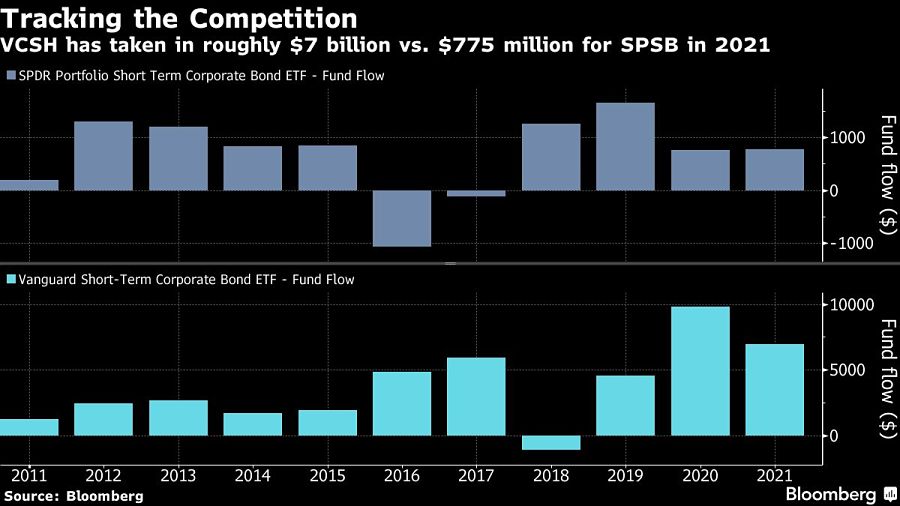

State Street Global Advisors is cutting fees on three corporate bond exchange-traded funds as it seeks to boost its share of the booming fixed-income ETF business.
The Boston-based issuer lowered the expense ratios to 0.04% from 0.07% for its short (SPSB), intermediate (SPIB) and long-term (SPLB) maturity focused corporate bond funds.
The reduction in fees is occurring as the use of such products is increasing among institutions, many of which have warmed to these types of ETFs following an embrace by the Federal Reserve, according to Bill Ahmuty, head of the SPDR fixed income group at State Street Global Advisors.
“A large catalyst coming out of the volatility of 2020 and Covid and this use of these funds in the Fed’s SMCCF program really helped as endorsements for fixed-income ETFs, and we continue to see an uptick in institutional usage, whether it’s insurance companies, asset managers,” and others, Ahmuty said in a phone interview, referring to the central bank’s Secondary Market Corporate Credit Facility, which was deployed to help support credit markets.

At one point last year, the Federal Reserve became one of the top holders in some of the world’s largest credit ETFs after it stepped into the market amid the coronavirus pandemic.
That’s helped push institutional players to see fixed-income ETFs as “a tool they can use,” Ahmuty said.
State Street’s move makes all three of those funds cheaper than similar products from competitors, including those from Vanguard, which charges 0.05% for its short (VCSH), intermediate (VCIT) and long-term (VCLT) corporate bond ETFs.
For comparison, VCSH has seen inflows of around $7 billion this year, data compiled by Bloomberg show, while State Street’s short-term product has taken in around $775 million in the same period. Investors have added almost $6.4 billion to Vanguard’s VCIT, while SPIB has seen an exodus of money so far in 2021.
That underscores how much more preferable one product can be over another in the eyes of large market participants. Ahmuty says State Street’s ETFs are now competitively priced and the company remains committed to reducing costs where possible.
As for the timing of the move, Ahmuty says that while equity markets are largely up this year, many fixed-income ETFs are lagging.
“So as we head into year-end, we see the opportunity for tax-loss harvesting with fixed-income ETFs,” he said. “A lot of folks always think of tax-loss harvesting as it relates to equity funds, but we see an opportunity here in fixed-income funds.”

Integrated Partners is adding a mother-son tandem to its network in Missouri as Kestra onboards a father-son advisor duo from UBS.

Futures indicate stocks will build on Tuesday's rally.

Cost of living still tops concerns about negative impacts on personal finances

Financial advisors remain vital allies even as DIY investing grows

A trade deal would mean significant cut in tariffs but 'it wont be zero'.
RIAs face rising regulatory pressure in 2025. Forward-looking firms are responding with embedded technology, not more paperwork.
As inheritances are set to reshape client portfolios and next-gen heirs demand digital-first experiences, firms are retooling their wealth tech stacks and succession models in real time.
